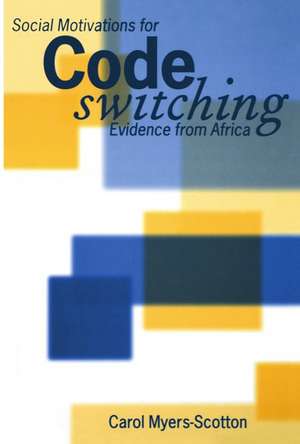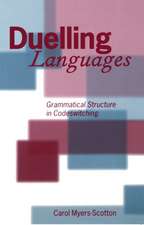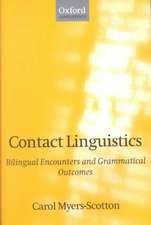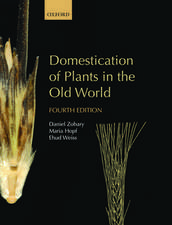Social Motivations for Codeswitching: Evidence from Africa: Oxford Studies in Language Contact
Carol Myers-Scottonen Limba Engleză Paperback – 17 aug 1995
Din seria Oxford Studies in Language Contact
- 34%
 Preț: 1155.03 lei
Preț: 1155.03 lei - 31%
 Preț: 412.97 lei
Preț: 412.97 lei - 31%
 Preț: 411.99 lei
Preț: 411.99 lei - 27%
 Preț: 361.20 lei
Preț: 361.20 lei - 31%
 Preț: 411.62 lei
Preț: 411.62 lei - 22%
 Preț: 301.32 lei
Preț: 301.32 lei - 27%
 Preț: 332.64 lei
Preț: 332.64 lei - 34%
 Preț: 1155.75 lei
Preț: 1155.75 lei - 34%
 Preț: 1421.16 lei
Preț: 1421.16 lei - 34%
 Preț: 1012.42 lei
Preț: 1012.42 lei - 34%
 Preț: 1422.32 lei
Preț: 1422.32 lei - 23%
 Preț: 266.12 lei
Preț: 266.12 lei - 34%
 Preț: 750.53 lei
Preț: 750.53 lei - 23%
 Preț: 282.43 lei
Preț: 282.43 lei - 26%
 Preț: 202.52 lei
Preț: 202.52 lei
Preț: 361.76 lei
Preț vechi: 500.51 lei
-28% Nou
Puncte Express: 543
Preț estimativ în valută:
69.22€ • 72.13$ • 57.32£
69.22€ • 72.13$ • 57.32£
Carte tipărită la comandă
Livrare economică 24-31 martie
Preluare comenzi: 021 569.72.76
Specificații
ISBN-13: 9780198239239
ISBN-10: 0198239238
Pagini: 190
Ilustrații: 3 maps
Dimensiuni: 155 x 234 x 13 mm
Greutate: 0.33 kg
Ediția:Revised
Editura: Clarendon Press
Colecția Clarendon Press
Seria Oxford Studies in Language Contact
Locul publicării:Oxford, United Kingdom
ISBN-10: 0198239238
Pagini: 190
Ilustrații: 3 maps
Dimensiuni: 155 x 234 x 13 mm
Greutate: 0.33 kg
Ediția:Revised
Editura: Clarendon Press
Colecția Clarendon Press
Seria Oxford Studies in Language Contact
Locul publicării:Oxford, United Kingdom
Recenzii
'Deserves to be congratulated not only for her findings, but for so clearly revealing where a next step could profitably be taken in this interdisciplinary research area that has for so long been of interest to linguistis, anthropologists, and sociologists.' Joshua A. Fishman in Anthropological Linguistics
'Myers-Scotton's model is a unique theoretical synthesis that organizes and explains - in one coherent albeit eclectic framework - most of the behavior that CS scholars have been discussing and theorizing about for decades ... An important work written engagingly by a notable sociolinguist who has been researching and writing on codeswitching for more than 20 years ... Required reading for teachers and students who research codeswitching phenomena, and for all sociolinguists and discourse analysts.' Walter F. Edwards in Language and Society
the book presents a more elaborated and refined version of the earlier proposals...Myers-Scotton's analysis is to be welcomed for its attempt to provide a more systematic and unified framework than previous descriptions of the motivations for code-switching. Her account provides many insights, all of them well illustrated...Myers-Scotton is to be credited with having produced a valuable and thought- provoking study, which had the merit of not only capturing many generalisations but also bringing into focus issues which still need more exploration
'A fascinating, sufficiently enlightening struggle to discover principles to explain how, why, and under what conditions persons who are more or less bilingual or multilingual spontaneously switch words, phrases, or whole sentences from one language to another in everyday conversation.'The Key Reporter, (Phi Beta Kappa Newsletter) Volume 58, 4 (Summer 1993)
`The book will be of interest to second language practitioners ... Myers-Scotton's book illuminations the importance of understanding sociopsychological values associated with all languages in the speech setting. It will be an important and essential addition to the libraries researchers in language contact and language policy.'Jan Bernsten, University of Michigan-Flint
the research presented in these two books exemplifies a thoroughness approaching the extraordinary ... So much energy! So much intelligence! Taken together, the books under review constitute a unique grammatical theory. Although the books are clearly intended for a general audience it cannot be denied that especially Africanists will get additional enjoyment from perusing Myers-Scotton's data base - the picture of Africa and the multilingual world that emerges from it is a vivid one.
Given this complexity of motivations for linguistic choices, is there a model that has general applicability? To my mind, Myers-Scotton's Markedness Model succeeds brilliantly in achieving this task. By using a single concept (namely, markedness) as an organizing device Myers-Scotton's model is fairly unique. It makes use of an explicit set of constructs which are linked together in such a way as to account for all types of codeswitching and their social motivations.
clear and easy to read ... Myers-Scotton's work has developed into the dominant paradigm for present-day research in this field ... we wish to stress ... the importance of Myers-Scotton's work for the field ... It has linked psycholinguistic, sociolinguistic, and grammatical concerns and contains a number of valuable ideas that can lead to further hypotheses and a clearer view of how bilinguals function.
we are impressed by the academic standards achieved by Carol Myers-Scotton in her work, which has already given the study of code switiching the boost it needed...the models are very clearly presented. The predictions they make are formulated as testable principles.
'Myers-Scotton's model is a unique theoretical synthesis that organizes and explains - in one coherent albeit eclectic framework - most of the behavior that CS scholars have been discussing and theorizing about for decades ... An important work written engagingly by a notable sociolinguist who has been researching and writing on codeswitching for more than 20 years ... Required reading for teachers and students who research codeswitching phenomena, and for all sociolinguists and discourse analysts.' Walter F. Edwards in Language and Society
the book presents a more elaborated and refined version of the earlier proposals...Myers-Scotton's analysis is to be welcomed for its attempt to provide a more systematic and unified framework than previous descriptions of the motivations for code-switching. Her account provides many insights, all of them well illustrated...Myers-Scotton is to be credited with having produced a valuable and thought- provoking study, which had the merit of not only capturing many generalisations but also bringing into focus issues which still need more exploration
'A fascinating, sufficiently enlightening struggle to discover principles to explain how, why, and under what conditions persons who are more or less bilingual or multilingual spontaneously switch words, phrases, or whole sentences from one language to another in everyday conversation.'The Key Reporter, (Phi Beta Kappa Newsletter) Volume 58, 4 (Summer 1993)
`The book will be of interest to second language practitioners ... Myers-Scotton's book illuminations the importance of understanding sociopsychological values associated with all languages in the speech setting. It will be an important and essential addition to the libraries researchers in language contact and language policy.'Jan Bernsten, University of Michigan-Flint
the research presented in these two books exemplifies a thoroughness approaching the extraordinary ... So much energy! So much intelligence! Taken together, the books under review constitute a unique grammatical theory. Although the books are clearly intended for a general audience it cannot be denied that especially Africanists will get additional enjoyment from perusing Myers-Scotton's data base - the picture of Africa and the multilingual world that emerges from it is a vivid one.
Given this complexity of motivations for linguistic choices, is there a model that has general applicability? To my mind, Myers-Scotton's Markedness Model succeeds brilliantly in achieving this task. By using a single concept (namely, markedness) as an organizing device Myers-Scotton's model is fairly unique. It makes use of an explicit set of constructs which are linked together in such a way as to account for all types of codeswitching and their social motivations.
clear and easy to read ... Myers-Scotton's work has developed into the dominant paradigm for present-day research in this field ... we wish to stress ... the importance of Myers-Scotton's work for the field ... It has linked psycholinguistic, sociolinguistic, and grammatical concerns and contains a number of valuable ideas that can lead to further hypotheses and a clearer view of how bilinguals function.
we are impressed by the academic standards achieved by Carol Myers-Scotton in her work, which has already given the study of code switiching the boost it needed...the models are very clearly presented. The predictions they make are formulated as testable principles.










